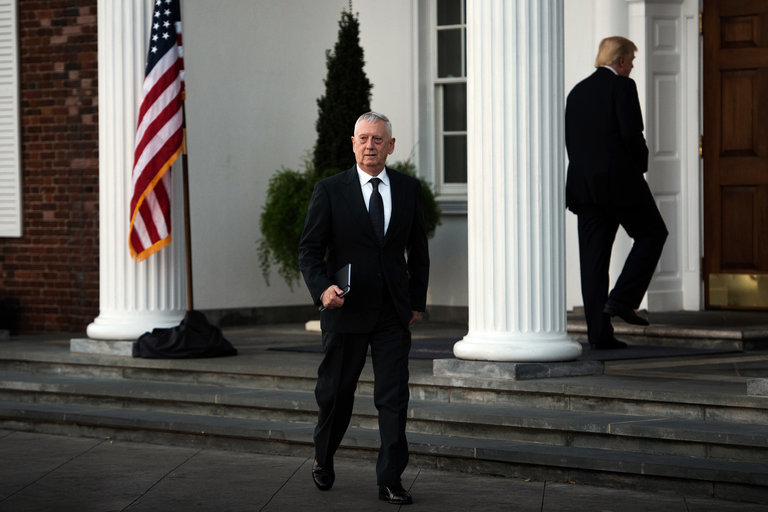Trump’s Mad Dog calls for ‘regime change’ in Tehran

TEHRAN – As the White House formulates its official policy on Iran, its defense chief James Mattis has said “regime change” is necessary before Iran and the U.S. can revel in normal relations.
In an interview with a journalism student at the Mercer Island High School Islander, Mattis branded Iran as a “revolutionary” rather than “functional” country which is “certainly the most destabilizing influence in the Middle East.”
Mattis, who has earned the sobriquet “Mad Dog” for his handling of U.S. troops in Iraq and Afghanistan, is long notorious for his anti-Iran animus.
In 2013, former president Barack Obama fired General Mattis, then the head of Central Command, reportedly for discrepancies over Iran.
One year before his removal, the antagonistic Marine had considered the three biggest threats to the U.S. to be “Iran, Iran, Iran.”
Mattis’s provocative remarks drew a strong rebuke from his Iranian counterpart, who likened Mattis to a “febrile patient” talking nonsense.
“Such remarks are similar to the delirium of a febrile patient,” Hossein Dehghan said on Tuesday.
The administration’s “regime change” policy was openly voiced in June by U.S. Secretary of State Rex Tillerson who said the U.S. major policy towards Tehran is to seek “peaceful transition” of the country’s government.
Tillerson raised the issue during a hearing on the 2018 State Department budget before the House Foreign Affairs Committee.
In a letter to UN Secretary-General Antonio Guterres and the UN Security Council, Iran strongly objected to Tillerson’s remarks, requesting “all States condemn such grotesque policy statements”.
“The Iranian government expects that all States condemn such grotesque policy statements and advise the U.S. government to act responsibly and to adhere to principles of the UN Charter and international law,” Gholamhossein Khoshroo, Iran’s ambassador to the UN, remarked on June 20.
Reacting to Mattis’s comments, Defense Minister Hossein Dehghan said: Such remarks are similar to the delirium of a febrile patient.
Khoshroo said the remarks brazenly contravene the 1981 Algiers Accords, to which Washington is a signatory.
“This statement is also a flagrant violation of the 1981 Algiers Accords and other treaty obligations to which the United States is a party.”
According to the Algiers Accords, “the United States pledges that it is and from now on will be the policy of the United States not to intervene, directly or indirectly, politically or militarily, in Iran’s internal affairs”.
Tillerson’s remarks had already drew strong rebuke from Tehran. Leader of the Islamic Revolution Ayatollah Ali Khamenei dismissed the statement as hackneyed and old, emphasizing that Washington has been and will continue to be a loser.
"In the past 38 years, when has there been a time when you haven't wanted to change the Islamic system?" he asked, adding, "Your head has hit the rock each time and always will."
Washington and Tehran have had no diplomatic ties since the 1980 hostage crisis, when a number of U.S. nationals were held in Iranian captivity for more than 400 days for espionage activities inside the U.S. embassy in Tehran.
Following that, Zarif tweeted: "U.S. officials should worry more about saving their own regime than changing Iran's, where 75% of people just voted,” a reference to the unprecedented turnout in the May 19 presidential election in Iran.
On June 18, Secretary of Iran's Supreme National Security Council reacted strongly, branding “American extremists and Daesh (Islamic State)” as “two sides of the same coin, both seeking to negatively influence the country’s internal environment and make security issues a major concern for Iran.”
Citing the U.S.-engineered coup in Iran in 1953, Foreign Ministry spokesman Bahram Qassemi said on June 16 that “since the 1950s, the United States has tried to meddle in Iranian affairs by different strategies such as coup d’état, regime change, and military intervention.”
These efforts have all failed, Qassemi said, adding that the new U.S. government was “confused” and could be “easily manipulated by wrong information.”
In June, the U.S. State Department declassified documents on the role it played in the 1953 coup against the democratically-elected government of Mohammad Mosaddegh.
The 1,000-page “Foreign Relations of the United States, Iran, 1951–1954” provides information on the use of covert operations in Iran by the Truman and Eisenhower administrations.
The documents cover the period around the 1953 coup d'état, which saw the overthrow of Mosaddegh and the strengthening of the monarchical rule of Mohammad Reza Pahlavi.
Iran’s Foreign Ministry also summoned the Swiss charge d’affaires to Tehran to protest at Tillerson’s remarks. A note handed to the envoy, whose country represents U.S. interests in Iran.
“Not the problem”, Iranian people ironically fall prey
Mattis’s interview also included his attempt to differentiate, as he would have it, between the Iranian “regime” and Iranian people, a differentiation that has not been materialized in the official policy of the Trump administration toward Iranians.
“The Iranian people are not the problem,” said Mattis “The Iranian people are definitely not the problem, it’s the regime….”
Contrary to the people-regime differentiation in Mattis’s comments, Trump’s visa order has set criteria for visa applicants from six Muslim-majority nations, including Iran, affecting more than anything else, “the Iranian people” as well as more people from the other five countries.
Denouncing the ban, Iran’s Foreign Minister Mohammad Javad Zarif on June 30 called it a “truly shameful exhibition of blind hostility to all Iranians" — and a measure that will prevent Iranian grandmothers from seeing their grandchildren in America.
PA/PA
Leave a Comment